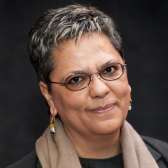
"Occupied Lives, Radical Kinship, and the Aftermath: Being in Nazi-Occupied Greece, 1941–1945"
Professional Background
Dr. Neni Panourgiá is Associate Professor of Anthropology, currently at the Institute for Comparative Literature and Society, and affiliated with the Harriman Institute at Columbia University. She received a bachelor’s degree in history from the American College of Greece before coming to the United States, where she received a PhD and an MA in anthropology from Indiana University. For her Charles H. Revson Foundation Fellowship, she conducted research on the social life in Greece under the tripartite occupation of Nazi Germany, Fascist Italy, and Bulgaria from 1941 to 1945.
Dr. Panourgiá is the author of numerous publications, including Dangerous Citizens: The Greek Left and the Terror of the State, which received the 2011 Edmund Keeley Prize of the Modern Greek Studies Association, the 2011 Victor Turner Prize for Ethnographic Writing of the American Anthropological Association, and an Honorable Mention for the 2009 PROSE Award.
She co-edited with George Marcus the volume Ethnographica Moralia: Experiments in Interpretative Anthropology (2008). As a consultant anthropologist for the Benaki Museum Photographic Archive in Athens, Greece, she wrote the introduction for and edited the English-language edition of East of Attica: Photographs 1930–1970 from the Benaki Museum Collections (2004). Her 1995 book, Fragments of Death, Fables of Identity: An Athenian Anthropography, won the Solomon-Pitré Grand Jury Prize from the International Society of Ethnohistory, co-won the Chicago Folklore Prize, and was a finalist for the 1998 Victor Turner Prize.
Dr. Panourgiá’s most recently published articles include “Tightrope (In the Manner of Antonio Lauria-Pericelli)” (Transforming Anthropology, 2011) and “Stones (papers, humans)” (Journal of Modern Greek Studies, 2010). She was a Senior Research Scholar at Columbia University’s Harriman Institute from 2010 to 2011 and currently serves on the executive board of the Modern Greek Studies Association. Fluent in Greek and English, she has French, Italian, and German language abilities, in addition to ancient Greek and Latin. She has reading knowledge of Byzantine paleography and her fieldwork languages include Arvanitika (the Greek register of 14th-century Greco-Albanian).
Fellowship Research
During her tenure at the Center, Dr. Panourgiá researched the social life in Greece under the tripartite occupation of Nazi Germany, Fascist Italy, and Bulgaria. Her preliminary thesis was that the crisis of the occupation affected women and children in such a way that it became an instrumental force in reconfiguring the social institutions of kinship and childhood. She examined why the notion of kinship dramatically expanded while “childhood disappeared.” Women in Greece played two roles, both preserving the country’s social fabric and also producing radically new conceptualizations of kinship. These new conceptualizations resulted from women coming out of domesticity to join the resistance but, unlike in other countries, this did not lead to a transformation of society on a more permanent scale. Women were allowed to vote for the first time in the 1944 Provisional Resistance Government’s general elections; the postwar government then rescinded the right before it was permanently reintroduced in 1952. With most men gone during the war, the emancipation of women in urban centers accelerated dramatically and led to the creation of alternate forms of kinship, long before feminist and queer movements came to the forefront of public life.
To complete her project, Dr. Panourgiá used oral and written histories of Greek women that she collected over the last 25 years, along with other artifacts donated to her by women in Greece. She also cross-referenced recently acquired collections in the Museum’s holdings from the Archives of Social History in Athens.
Dr. Panourgiá was in residence at the Mandel Center from October 1, 2011 to February 29, 2012.
